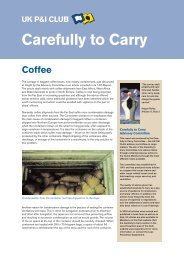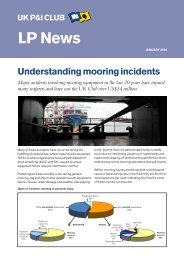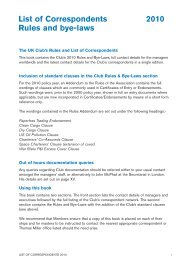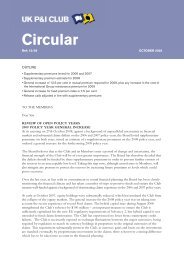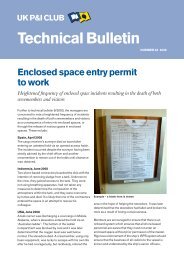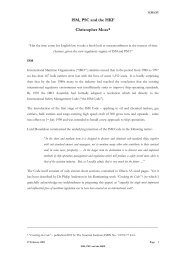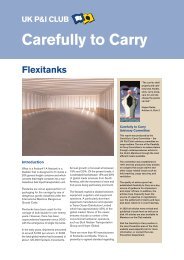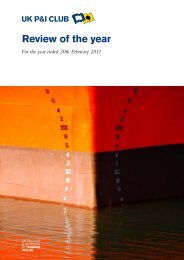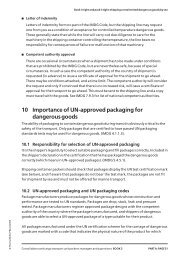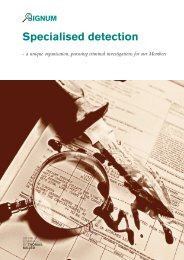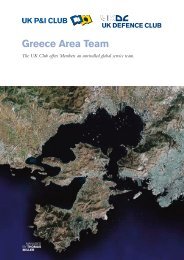Biofuels - UK P&I
Biofuels - UK P&I
Biofuels - UK P&I
You also want an ePaper? Increase the reach of your titles
YUMPU automatically turns print PDFs into web optimized ePapers that Google loves.
Future developments<br />
Up to this point, discussion has been limited to FAME<br />
and bioethanol, the so called ‘first-generation’ biofuels.<br />
The Renewable Energy Directive was updated in<br />
December 2008 to include sustainability criteria for<br />
biofuels, amid worries that the biofuels currently in<br />
production were not being produced in a sustainable<br />
manner. In order to meet the various legislative targets,<br />
not only will the volumes of biofuels used need to<br />
increase, but technology will need to be developed and<br />
made commercially viable to bring new, sustainable<br />
biofuels onto the market. Examples of such biofuels<br />
include; biodiesel produced from algal oil, biodiesel<br />
produced from the crop jatropha (which does not<br />
compete with food crops for land), bio-butanol (which is<br />
a slightly longer chain alcohol than ethanol) produced<br />
from renewable sources of biomass, and ‘renewable<br />
diesel’, a synthetic diesel which would meet the EN590<br />
diesel standard, produced by the catalytic<br />
hydrogenation of vegetable oils.<br />
Conclusions<br />
It is clear that the integration of biofuels and blends of<br />
biofuels with conventional fuels into our current fuel<br />
infrastructure has raised a number of issues, many of<br />
which were unforeseen and have only come to light<br />
after the introduction of the fuels. The majority of the<br />
problems concern FAME, both as a neat product and as<br />
a blend with petroleum diesel. The variety in the<br />
feedstock which can be used to produce FAME can<br />
impart very different properties on the FAME produced.<br />
In Europe there is currently only a single FAME<br />
standard, and the particular type of FAME, and<br />
therefore the properties the material may be expected<br />
to display, may not always be clear from the shipping<br />
documents.<br />
The major issues for consideration for those involved in<br />
shipping FAME are the high potential for water<br />
contamination and associated problems with<br />
microbiological spoilage, and, whilst a 5 ppm limit<br />
remains in the DEFSTAN 91-91 jet fuel specification,<br />
the potential for contamination of jet fuel cargos by<br />
traces of FAME. Additionally, the relative instability and<br />
sensitivity of the material to low temperatures and<br />
trace metals require extra care in terms of how the<br />
product is handled. Bioethanol and gasoline blends are<br />
also sensitive to water contamination with the potential<br />
for irreversible phase separation to occur if the level of<br />
water passes a certain threshold level.<br />
Of course, it is possible that as blend levels increase,<br />
new and unforeseen problems will arise that will<br />
require further research and new approaches to our<br />
way of dealing with these materials. It is likely that<br />
biofuels will continue to provide a very real challenge<br />
to all those involved in their production and distribution<br />
over the coming years, and a knowledge of the often<br />
quite unique properties that these products display will<br />
be very beneficial for those wanting to minimise the risk<br />
of facing unwanted claims.<br />
Acknowledgements: Richard Minton, Minton Treharne & Davies Ltd<br />
<strong>UK</strong> P&I CLUB<br />
IS MANAGED<br />
BY THOMAS<br />
MILLER<br />
For further information please contact:<br />
Loss Prevention Department, Thomas Miller P&I Ltd<br />
Tel: +44 20 7204 2307. Fax +44 20 7283 6517<br />
Email: lossprevention.ukclub@thomasmiller.com



